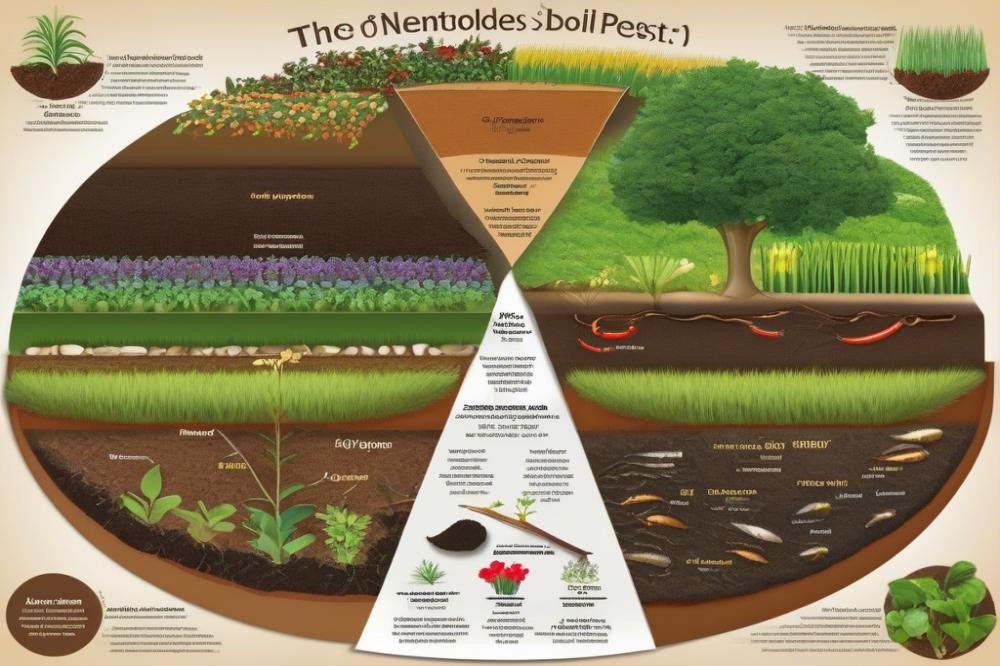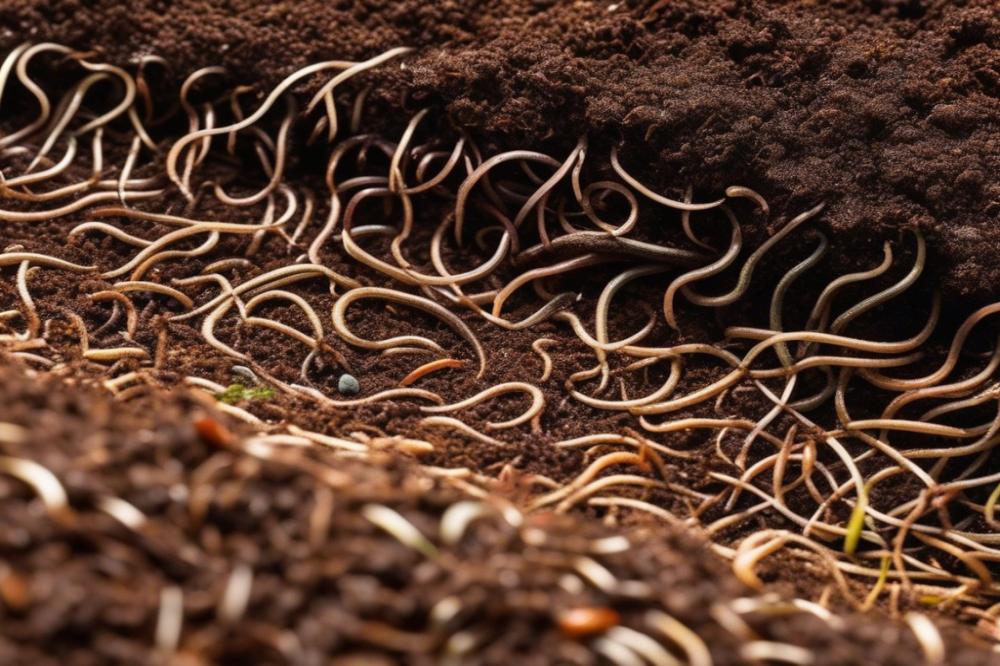The Role of Nematodes in Controlling Soil Pests
Nematodes are tiny, unsegmented worms that play an important role in the soil ecosystem. They are found in diverse environments and contribute significantly to soil health. Among the various species, some are considered beneficial because they help manage Soil Pests. This biological control method allows for more sustainable farming practices.
Natural pest control methods have gained attention among farmers aiming to reduce reliance on chemical pesticides. By utilizing beneficial nematodes, agriculturalists can target harmful organisms without disrupting the balance of their ecosystems. Such methods can include crop rotation, introducing natural predators, and creating habitats for beneficial organisms.
Sustainable farming practices focus on minimizing environmental impact while maintaining agricultural productivity. Preserving ecological balance is vital for long-term health of the land. Healthy soils foster prosperous crops, which further supports communities. Pest management strategies that incorporate natural solutions like nematodes are essential to achieving this goal.
Farmers can protect their crops by understanding the different nematode species available. These organisms can target various pests that threaten plant health. By embracing these natural methods, agriculturalists pave the way for enhanced soil ecosystems, promoting both crop protection and ecological well-being.
Understanding Nematodes


Nematodes are tiny roundworms found in soil. They typically measure only a few millimeters in length, and most are invisible to the naked eye. These organisms play a significant role in the soil ecosystem. Different nematode species have varying lifestyles and habitats. Some thrive in damp soil, while others prefer dry conditions.
Not all nematodes are harmful. Some act in beneficial ways. Beneficial nematodes actively hunt and kill pest species, contributing to biological control. They target harmful insects that damage crops. An example is the Steinernema genus, which controls pests like grubs and root weevils. In contrast, harmful nematodes can cause serious damage to plants. One well-known pest is the root-knot nematode, which invades the roots and disrupts soil health.
Among the key nematode species used in pest management, several stand out. Heterorhabditis species are also valuable for agriculture. They often target insects that are at different life stages. While these nematodes fight against harmful insect populations, they also help maintain ecological balance. By promoting healthy soil, they support sustainable farming practices. This reinforces crop protection by minimizing reliance on chemical pesticides, which can harm beneficial organisms.
Awareness of the roles played by these microscopic organisms is essential. Understanding which nematodes are beneficial and which are harmful can help farmers make better decisions. A healthy soil ecosystem relies on the diversity of organisms, including nematodes. Embracing their role in pest control can lead to more resilient crops and improved farm productivity.
Biological Control Using Nematodes


Biological control methods play a vital role in pest management. Instead of relying on harsh chemicals, these methods use natural organisms to battle pests. This approach can help maintain the ecological balance in farming. Healthy ecosystems are essential for sustainable agriculture. When considering alternative solutions, it is good to explore options that are both effective and environmentally friendly.
Various species contribute significantly to biological control. Beneficial nematodes are one such group. These tiny creatures enter the bodies of many soil pests, such as insects and larvae. Once inside, they release bacteria that kill the pests. As a result, these nematodes help reduce pest populations while leaving beneficial insects unharmed. Their role highlights a natural mechanism for crop protection.
Using nematodes presents numerous benefits compared to traditional pesticides. Chemical pesticides can harm the soil ecosystem, disrupting the delicate balance of life within it. In contrast, beneficial nematodes support soil health without the downsides of synthetic options. They target specific pests, which minimizes collateral damage to non-target species. This targeted approach also helps farmers avoid developing pest resistance. With increased focus on sustainable farming practices, integrating these natural controllers becomes even more appealing. The advantages of biological control are clear for both farmers and the environment.
Nematodes and Soil Health


These tiny roundworms play a vital role in promoting soil health and fertility. Beneficial nematode species contribute significantly to the breakdown of organic matter. During this process, nutrients are released back into the soil, enriching it for plants. Improved nutrient availability directly affects crop growth, allowing farmers to enhance their yields.
A diverse soil ecosystem is essential for maintaining ecological balance. Various nematode types interact with other soil organisms, fostering a more complex web of life. This interaction helps boost the resilience of the soil. Healthy soil supports a wider range of plants and animals, which in turn helps in controlling pest populations through natural means.
The link between strong soils and effective pest management cannot be dismissed. By engaging in sustainable farming practices, farmers create conditions where natural pest control thrives. When nematodes are present, they help combat soil pests that threaten crops. This biological control reduces the need for chemical pesticides, promoting a healthier environment.
Practices like crop rotation and cover cropping support the population of beneficial nematodes. Healthy soils not only provide nutrients but also encourage the presence of these unique organisms. Each year, research highlights the importance of maintaining biodiversity in soil ecosystems. Farmers can protect their crops more effectively when they work in harmony with nature.
Utilizing natural allies like these roundworms contributes to long-term agricultural success. They offer an environmentally friendly option for pest management without harming other beneficial species. This synergy between different elements of the soil underlines the importance of every organism in the ecosystem. Together, they form a resilient structure, capable of withstanding various challenges faced in agriculture today.
Application of Nematodes in Agriculture


How to Introduce Beneficial Nematodes into Gardens and Farms
Introducing beneficial nematodes into gardens and farms can be a key step in effective pest management. First, selecting the right nematode species for your specific pests is crucial. Some species target certain soil pests, while others may not be effective. After choosing the appropriate type, it’s vital to apply them at the right time. Soil temperature and moisture levels play a significant role in their survival and effectiveness.
Next, prepare the soil by ensuring it is moist but not overly saturated. This environment supports the movement of nematodes in the soil ecosystem. They thrive in environments that mimic their natural habitats. Distributing them evenly throughout the targeted area is essential. You can mix them with water and use a sprayer to spread them widely.
Strategies for Effective Nematode Application
Effective application strategies can enhance the impact of these biological control agents. Timing of application is important. Applying beneficial nematodes during peak pest activity can lead to better results. Maintaining soil health is another vital aspect of successful pest management. Healthy soil supports diverse life that can complement the actions of the nematodes.
Covering the area with organic mulch can help retain moisture and protect them from environmental stress. Monitoring pest populations and adjusting your strategy as needed is beneficial. Remember to avoid chemical pesticides immediately after application. Chemicals can harm the beneficial species and disrupt the ecological balance in the soil.
Case Studies Demonstrating Success in Crop Protection
Numerous case studies highlight the success of using these organisms in agriculture. In one instance, a farmer faced severe root knot nematode infestations in their vegetable crops. After introducing specific nematode species aimed at controlling the pests, a significant reduction in pest populations followed. Over time, crop yields improved.
Another study focused on ornamental plants in commercial nurseries. The introduction of beneficial nematodes resulted in healthier plants with fewer pest issues. Growers reported satisfaction with the decrease in reliance on chemical treatments. This led to not only healthier crops but also a more sustainable farming approach.
These examples illustrate how incorporating beneficial nematodes can lead to successful crop protection while enhancing soil health. When managed properly, these organisms serve as powerful allies in maintaining a healthy agricultural ecosystem.
Challenges and Considerations
Using beneficial nematodes for pest management presents several challenges. One major obstacle is the need for proper species selection. With many nematode species available, understanding which ones thrive in specific soil conditions is vital. Each species may have different effects on pest populations. If the wrong type is chosen, results can be disappointing.
Environmental factors also play a crucial role in the effectiveness of biological control. Soil health impacts the survival rates of these organisms. A well-balanced soil ecosystem is necessary for them to flourish. Changes in moisture levels, temperature, and nutrient content can influence their performance. Therefore, it is essential to monitor these factors closely.
Another consideration involves the timing of application. Applying nematodes during their active life cycle is necessary for successful crop protection. Timing can vary based on the pests being targeted and local climate conditions. Making sure to match these elements is essential for effective results.
Furthermore, maintaining ecological balance is important. The introduction of beneficial nematodes can disrupt existing soil interactions. This can lead to an imbalance that might affect other soil organisms. Close attention must be paid to how these additions fit into the larger picture of sustainable farming. Promoting a diverse soil ecosystem is paramount for long-term success.
Lastly, educating farmers and stakeholders about these practices is crucial. Training on the benefits and limitations of using nematodes can increase successful use in agriculture. Comprehensive understanding leads to better decision-making and strengthens pest management strategies. Awareness of potential risks associated with introducing new species will also guide responsible practices.
Final Thoughts on Nematodes in Soil Pest Management
In summary, using these tiny organisms offers notable benefits in controlling soil pests. They work silently yet effectively, targeting harmful insects without damaging plants or the environment. Scientific studies have shown that integrating them into agricultural systems can reduce the need for chemical pesticides. This can lead to healthier crops and a more balanced ecosystem.
Integrating nematode species into sustainable farming practices is crucial for long-term success. Farmers can maintain soil health while managing pests. When combined with other strategies, biological control can create a powerful approach to pest management. This method promotes biodiversity, which is essential for resilient agricultural systems.
Looking ahead, the future appears promising for biological pest management. As researchers discover more about these organisms, their potential to help farmers will grow. More farmers will likely consider innovative solutions like these in their pest control toolbox. Embracing this strategy may lead to healthier agriculture, benefiting both producers and consumers.



